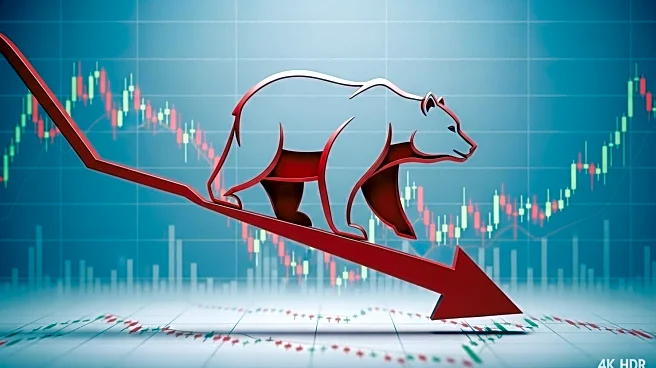What is the story about?
What's Happening?
Short-bias exchange-traded funds (ETFs), which are designed to profit from declining stock indexes, are experiencing substantial inflows as investors brace for potential market corrections. According to LSEG Lipper data, global short-bias funds attracted $3.7 billion in September, marking the largest monthly inflow in nearly three years. U.S. funds accounted for $2.2 billion of these inflows, while Japanese and South Korean funds received $653 million and $424 million, respectively. The trend has continued into October, with an additional $1.4 billion flowing into these funds. This surge in interest is partly driven by concerns over high valuations and policy risks, as major indices like the S&P 500 and Nasdaq have reached record highs this year. The forward 12-month price-to-earnings ratio of the MSCI World index is at a near five-year high, raising fears of a market correction.
Why It's Important?
The significant inflows into short-bias ETFs highlight growing investor unease about the sustainability of current stock market valuations. Historically, such funds have seen increased interest during periods of financial stress, such as the 2008 financial crisis. The current situation is compounded by warnings from financial leaders and institutions, including the Bank of England and JPMorgan Chase CEO Jamie Dimon, about the risks of a market reversal. These developments could have broad implications for U.S. financial markets, potentially affecting asset prices and investor confidence. A market correction could lead to significant losses for investors who are heavily invested in equities, particularly in sectors like technology and artificial intelligence, which have driven recent market gains.
What's Next?
As concerns about a potential market correction grow, investors and financial institutions are likely to continue monitoring economic indicators and policy developments closely. The Federal Reserve's actions and statements will be particularly scrutinized, as they could influence market sentiment and asset repricing. Additionally, geopolitical factors, such as political deadlocks in France and Japan, may further impact global markets. Investors may increasingly turn to hedging strategies, including short-bias ETFs, to mitigate potential losses. The situation remains fluid, and stakeholders will need to adapt to evolving market conditions.
Beyond the Headlines
The increased interest in short-bias ETFs may also reflect broader shifts in investment strategies, as investors seek to balance risk and reward in an uncertain economic environment. This trend could lead to more diversified portfolios and a reevaluation of traditional investment approaches. Additionally, the focus on market corrections underscores the importance of financial literacy and risk management for individual investors, who may need to navigate complex market dynamics.














